人教新目标(Go for it)版九年级全册Unit 1 How can we become good learners-Section A (1a-2d)课件(共46张PPT)
文档属性
| 名称 | 人教新目标(Go for it)版九年级全册Unit 1 How can we become good learners-Section A (1a-2d)课件(共46张PPT) |
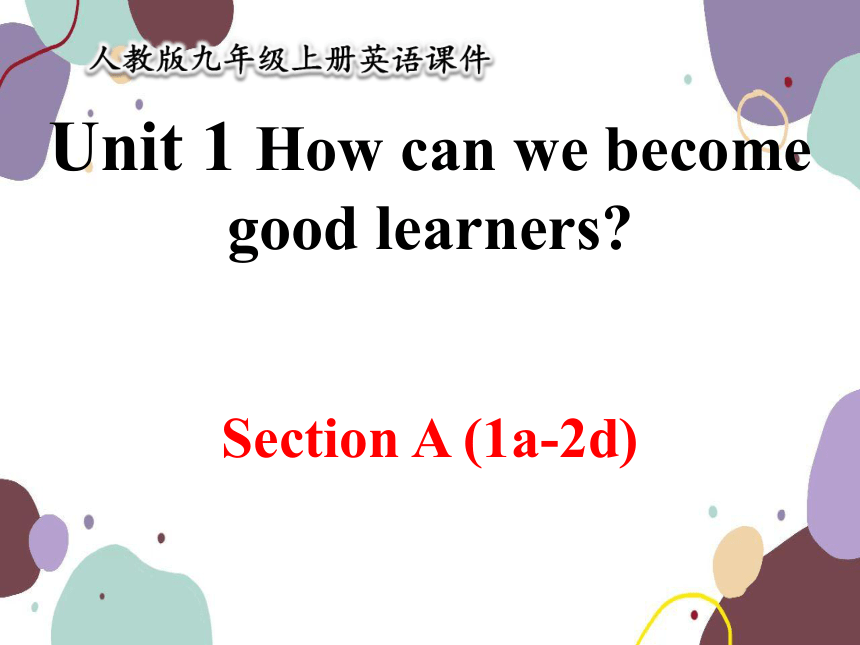
|
|
| 格式 | pptx | ||
| 文件大小 | 23.4MB | ||
| 资源类型 | 教案 | ||
| 版本资源 | 人教新目标(Go for it)版 | ||
| 科目 | 英语 | ||
| 更新时间 | 2023-07-06 00:00:00 | ||
图片预览

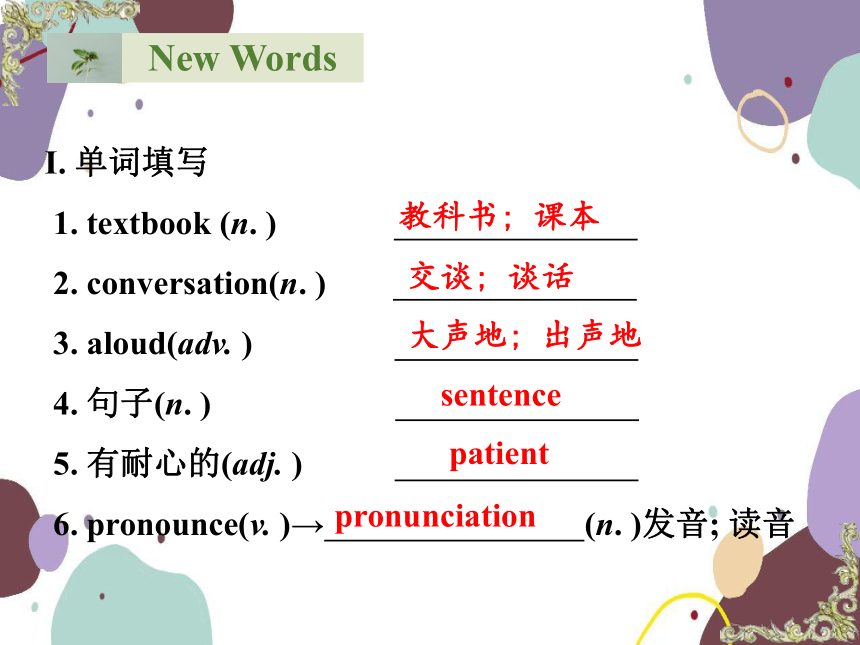
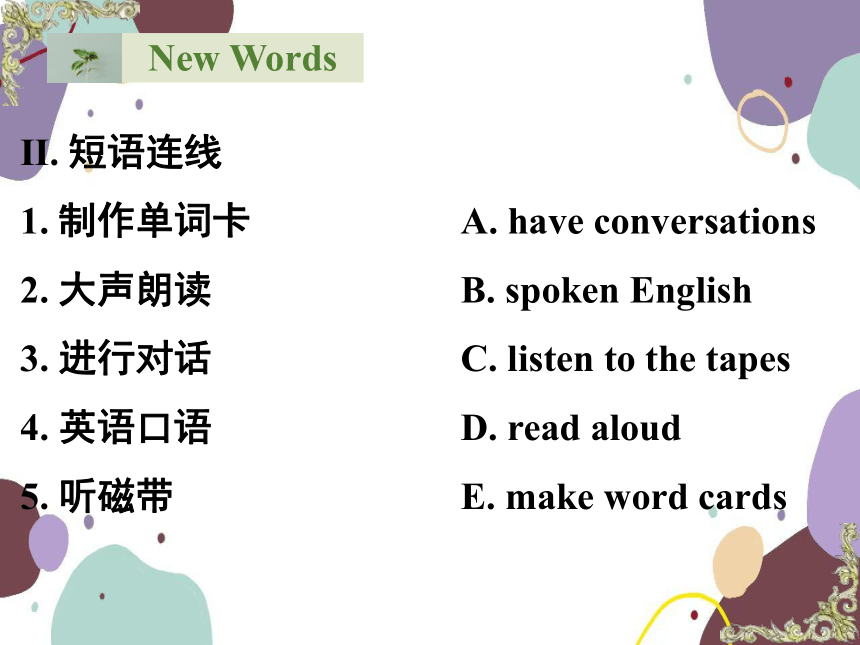
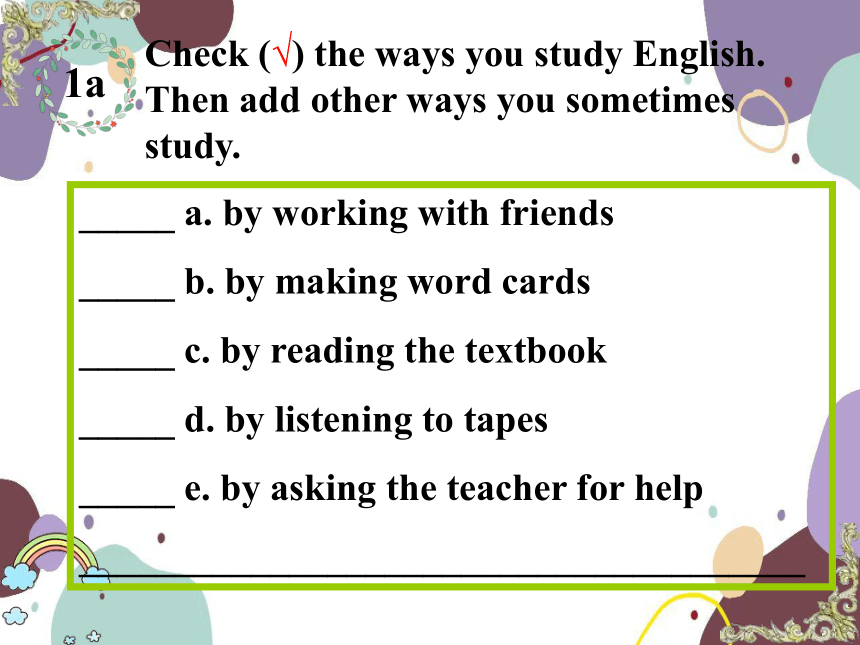
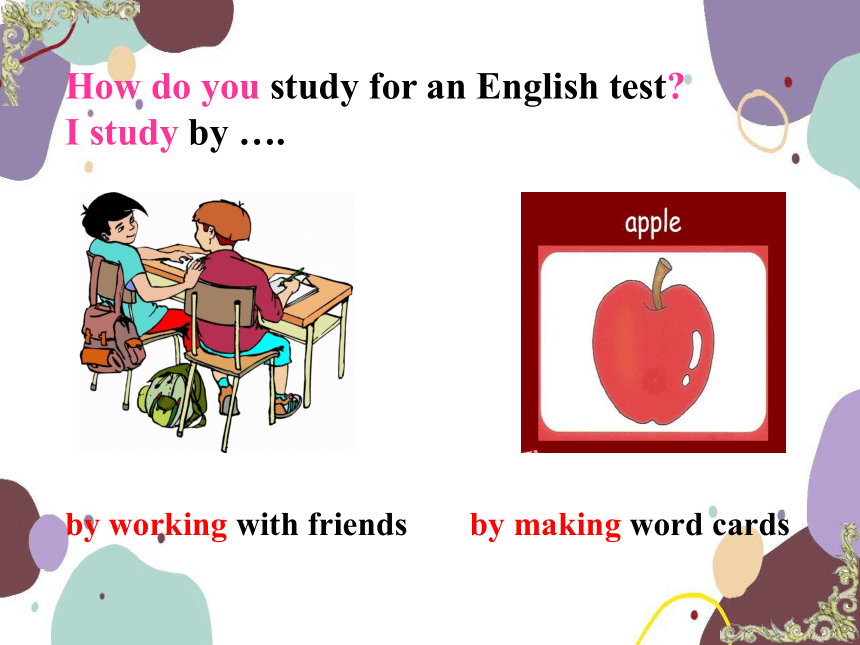
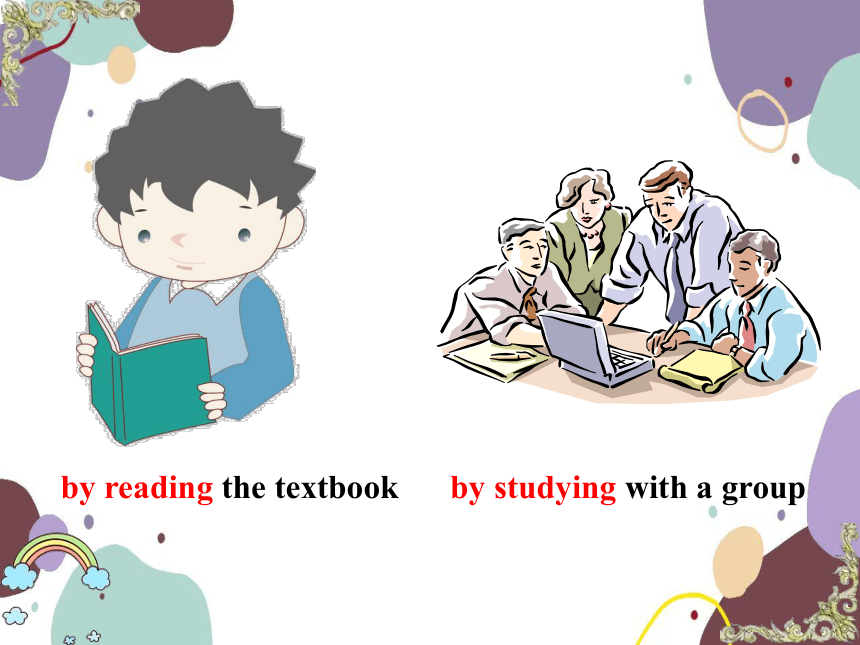
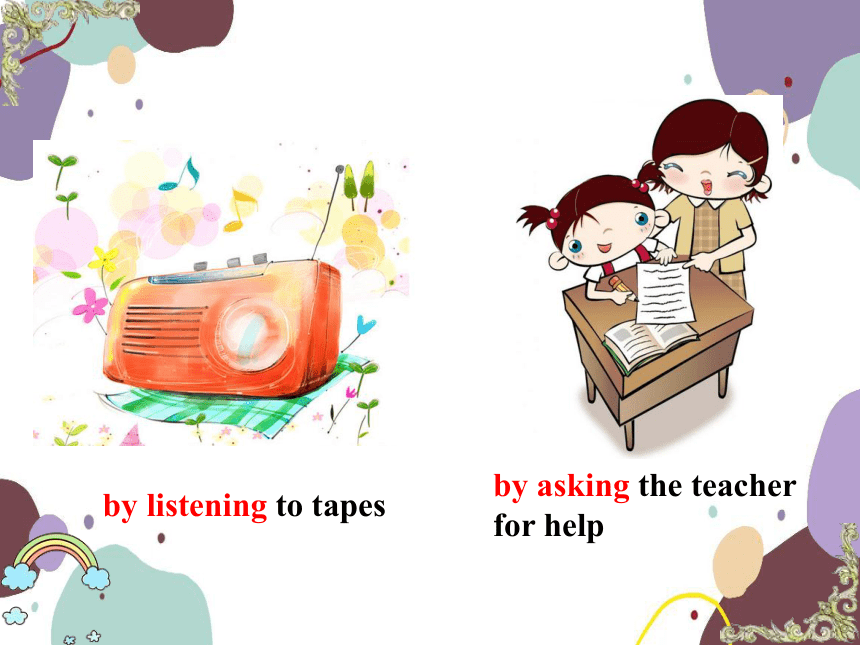
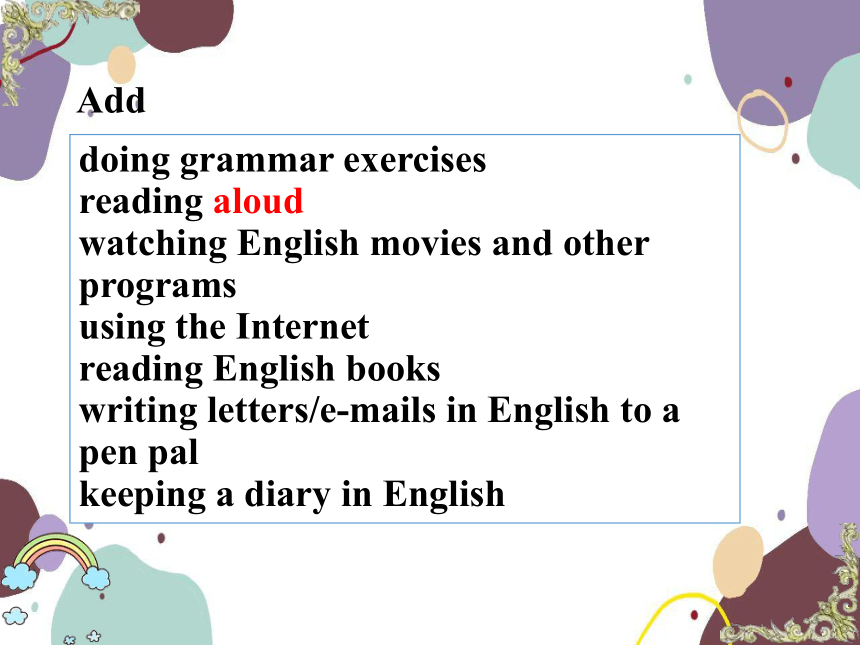
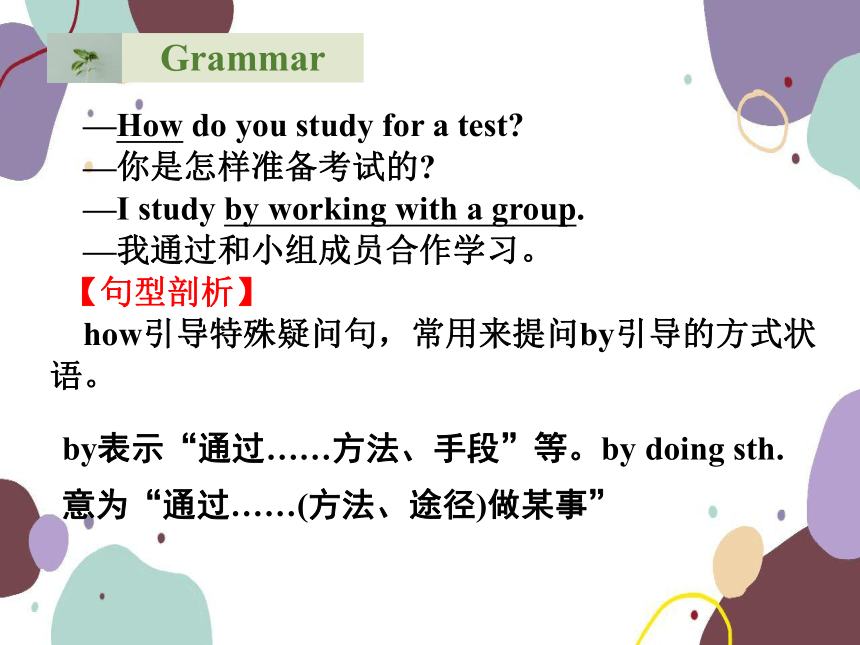
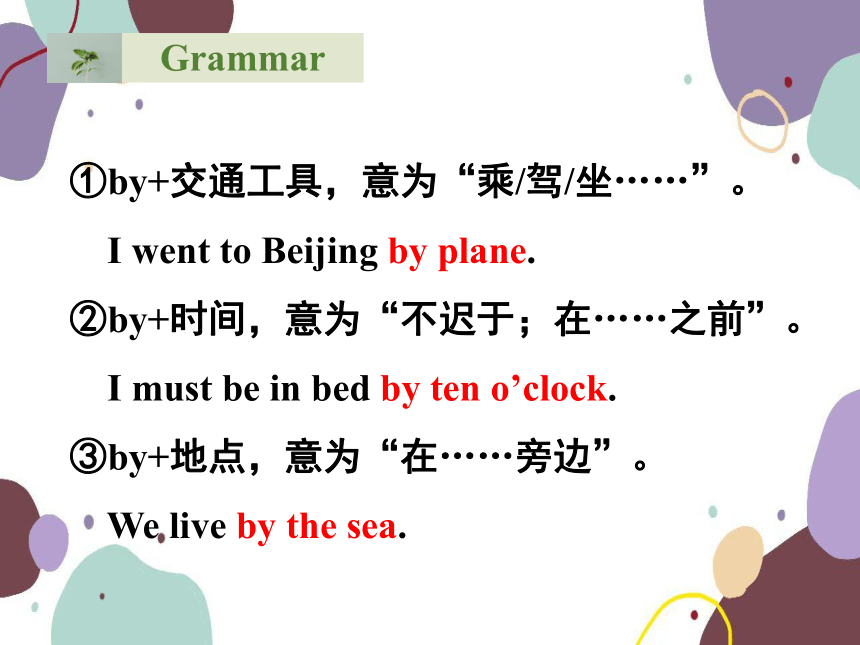

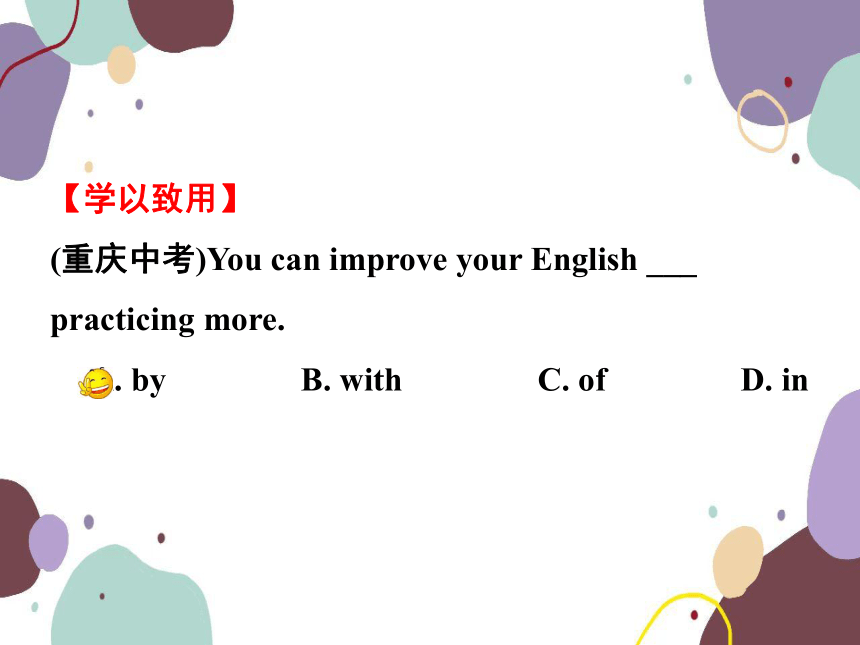
文档简介
(共46张PPT)
人教版九年级上册英语课件
Section A (1a-2d)
Unit 1 How can we become good learners
New Words
Ⅰ. 单词填写
1. textbook (n. )
2. conversation(n. )
3. aloud(adv. )
4. 句子(n. )
5. 有耐心的(adj. )
6. pronounce(v. )→ (n. )发音; 读音
教科书; 课本
交谈; 谈话
大声地; 出声地
sentence
patient
pronunciation
Ⅱ. 短语连线
1. 制作单词卡 A. have conversations
2. 大声朗读 B. spoken English
3. 进行对话 C. listen to the tapes
4. 英语口语 D. read aloud
5. 听磁带 E. make word cards
New Words
1a
Check (√) the ways you study English. Then add other ways you sometimes study.
_____ a. by working with friends
_____ b. by making word cards
_____ c. by reading the textbook
_____ d. by listening to tapes
_____ e. by asking the teacher for help
______________________________________
How do you study for an English test
I study by ….
by working with friends
by making word cards
by reading the textbook
by studying with a group
by listening to tapes
by asking the teacher for help
Add
doing grammar exercises
reading aloud
watching English movies and other programs
using the Internet
reading English books
writing letters/e-mails in English to a pen pal
keeping a diary in English
by表示“通过……方法、手段”等。by doing sth. 意为“通过……(方法、途径)做某事”
—How do you study for a test
—你是怎样准备考试的
—I study by working with a group.
—我通过和小组成员合作学习。
【句型剖析】
how引导特殊疑问句,常用来提问by引导的方式状语。
Grammar
①by+交通工具,意为“乘/驾/坐……”。
I went to Beijing by plane.
②by+时间,意为“不迟于;在……之前”。
I must be in bed by ten o’clock.
③by+地点,意为“在……旁边”。
We live by the sea.
Grammar
【妙辨异同】 by/in/with的用法辨析
by 表示“通过……方法、手段”等。by doing sth.
意为“通过……(方法、途径)做某事”
in 用某种材料(如用墨水、铅笔等)或用某种语言或者表示衣着、声调、特点等
with 使用工具、方法或人体部位等
Grammar
【学以致用】
(重庆中考)You can improve your English ___ practicing more.
A. by B. with C. of D. in
aloud adv. 大声地;出声地
【语境领悟】
What about reading aloud to practice pronunciation
通过大声朗读来练习发音怎么样
Try to speak loud enough so that people can hear you clearly.
你尽量大声讲话以便于人们能够听清楚。
Don’t play the music so loudly.
别把音乐放得这么大声。
Grammar
【妙辨异同】aloud/loud/loudly的用法辨析
aloud 副词, 意为“大声地; 出声地”, 常与read, call, shout等词连用
loud 意为“出声(的)地;大声(的)地”, 常与speak, talk等词连用
loudly 副词, 意为“大声地; 响亮地; 吵闹地”, 与quietly相对
Grammar
【学以致用】
①请大声朗读这篇课文。
Please__________ the text_________ .
②他们正在舞台上高声歌唱。
They are singing__________ on the stage.
read
aloud
loudly
Listen. How do these students study for a test Write letters from 1a above.
_____1.Meiping _____2.Peter _____3.Tony
b
e
d
1b
Make conversations about how you study for a test.
A: How do you study for a test
B: I study by working with a group.
1c
Report: … studies for a test by …
How do your friends study for a test
Ask and report.
Report
Listen and check (√) the questions you hear.
2a
与某人交谈/会话
√
√
√
√
What about listening to tapes 听磁带怎么样
【句型剖析】
What about/How about. . . 意为“……怎么样 ”, 常用来征求对方的意见或询问有关情况, about为介词, 其后接名词、代词或动名词。
【学以致用】
(邵阳中考)—What about ______ a rest
—OK! Let’s go for a walk.
A. to take B. take C. taking
【归纳拓展】常用来提出建议的句型
提出建议
What about doing sth.
Shall we do sth.
You’d better (not)do sth.
Let’s do sth.!
Would you mind doing sth.
Why don’t you do sth.
ever用于疑问句时,意为“曾经”。该问句的回答中不能再含有ever,如果是否定回答则常用never。
eg.:—Have you ever been to Mount Emei
—Yes, I have. / No, never.
Tony is very nice. He is the most enjoyable person I ____.
A. meet ever B. have ever met C. had ever met
B
Listen again. Match each answers below with a question above.
Questions
1. __ Does anyone learn English by watching videos
2. __ Do you have conversations with friends in English
3. __ What about listening to tapes
4. __ What about reading aloud to practice pronunciation
5. __ Have you ever studied with a group
a. Yes, I have. I’ve learned a lot that way.
b. Oh, yes. It really improves my speaking skills.
c. I do that sometimes. I think it helps.
d. No. It’s too hard to understand spoken English.
d
b
c
a
2b
It’s too hard to understand spoken English.
It + is +形容词+to do sth. 做某事是……的。此句型中,it是形式主语,动词不定式是真正的主语。
学好英语很重要。
It’s important to study English well.
I’ve learned a lot that way.
定义:现在完成时表示过去发生的某一动作对现在造成的影响或产生的结果;或这一动作开始于过去,持续到现在,并将继续下去。
现在完成时
构成:
1. 肯定句“have (has)+过去分词”。
注意:该句式中的have或has是助动词,has用于第三人称单数,其它人称一律用have。
2. 否定句: “haven’t(hasn’t)+过去分词”。
3. 疑问句:是把助动词have或has提到主语之前。
回答:Yes, …have (has). /No, …haven’t (hasn’t).
现在完成时
时间状语:already, yet, ever, never, just, before, several times 等。
注意:当have被用在现在完成时态中时,它可以和前面 的代名词一起组成缩写形式。
举例:我曾经到过纽约。
I’ve been to New York once before.
我刚丢了我的铅笔盒。
I’ve just lost my pencil-box.
现在完成时
同学们要注意现在完成时与一般过去时的区别。虽然这两个时态都和过去发生的事情有关,但是现在完成时强调这一动作与现在的关系,如对现在产生的结果、影响等,而一般过去时只表示过去的事实,不表示和现在的关系。
现在完成时与一般过去时
Make conversations using the information in 2a and 2b.
A: Have you ever studied with a group
B: Yes, I have. I’ve learned a lot that way.
2c
Do you learn English by watching videos
No. It’s too hard
to understand
spoken English.
What about reading aloud to practice pronunciation
I do that
sometimes.
I think it helps.
Role-play
Role-play the conversation.
2d
Jack: Annie, I’m a little nervous. I have to finish reading a book and give a report next Monday.
Annie: That doesn’t sound too bad.
Jack: But I’m a very slow reader.
Annie: Just read quickly to get the main ideas at first. Don’tread word by word. Read word groups.
Jack: But I don’t understand many of the words. I have to use a dictionary.
起先,起初
Annie: Try to guess a word’s meaning by reading the sentences before and after it. You probably understand more than you think.
Jack: That sounds difficult!
Annie: Well, be patient. It takes time. You can become better by reading something you enjoy every day. The more you read, the faster you’ll be.
a little 意为“有点儿”,相当于a bit,两者都可作程度副词,表示“稍微、一点儿”的意思,修饰动词、形容词、比较级等,二 者可以互换。
I’m a little nervous.
可以直接修饰不可数名词
修饰不可数名词时,只能用a bit of
I drank a little milk.
=I drank a bit of milk.
I have to finish reading a book and give a report next Monday.
finish:完成,后面接动词-ing形式。
常跟动词-ing形式的动词
finish practice consider suggest
miss enjoy mind
That doesn’t sound too bad.
sound此处用作连系动词,意为“听起来”,后面接形容词。
英语中常用的连系动词
一是(be),一感(feel),一保持(keep)
起来四个(sound,look,smell,taste)
好像(seem)变了三(get,turn,become)
Try to guess a word’s meaning by reading the sentences before and after it.
意为“试图做某事,尽力做某事”
意为“尝试做某事”
表示想尽一切办法做某事
表示一种试着做做看的做法
Well, be patient. 嗯,耐心点。
patient作形容词,意为“忍耐的, 有耐心的”。
eg: The young cashier gave a patient sigh.
还可作名词,意为“患者, 病人”。
eg:The patient was amused at the music.
【拓展】be patient of sth. 容忍某物
be patient to do sth. 有耐心干某事
be patient with 对(某人)有耐心
The more you read, the faster you’ll be.
the+比较级,the+比较级,意为“越……,就越……”
你学得越多,懂得的就越多。
The more you learn, the more you know.
Ⅰ. 用所给词的适当形式填空
1. I think reading aloud is a good way to
practice (pronounce).
2. Just like__________ (speak)language, body language varies from culture to culture.
3. I study for a test by__________ (work)with friends.
pronunciation
spoken
working
Exercise
4. Be quiet! He hasn’t finished_________ (speak).
5. —What about________ (join)an English club to improve English
—That sounds good.
speaking
joining
Ⅱ. 句型转换
1. Why not ask the teacher for help (改为同义句)
___________ ________ asking the teacher for help
2. Mary studies for an English test by listening to tapes. (对画线部分提问)
_______ _______ Mary________ for an English test
3. Jenny was so excited that she couldn’t say anything at the news. (改为同义句)
Jenny was_______ excited_____ say anything at the news.
What/How about
How does
study
too
to
4. Have you ever watched English movies (作肯定回答)
_______, I_______.
5. Li Ming learns English by watching English programs. (改为一般疑问句)
_____Li Ming______ English by watching English programs
Yes
have
Does
learn
书面作业 (Writing work)
(1)默写所学的新单词
(2) 完成学生用书的相关作业
Homework
谢谢观看
人教版九年级上册英语课件
Section A (1a-2d)
Unit 1 How can we become good learners
New Words
Ⅰ. 单词填写
1. textbook (n. )
2. conversation(n. )
3. aloud(adv. )
4. 句子(n. )
5. 有耐心的(adj. )
6. pronounce(v. )→ (n. )发音; 读音
教科书; 课本
交谈; 谈话
大声地; 出声地
sentence
patient
pronunciation
Ⅱ. 短语连线
1. 制作单词卡 A. have conversations
2. 大声朗读 B. spoken English
3. 进行对话 C. listen to the tapes
4. 英语口语 D. read aloud
5. 听磁带 E. make word cards
New Words
1a
Check (√) the ways you study English. Then add other ways you sometimes study.
_____ a. by working with friends
_____ b. by making word cards
_____ c. by reading the textbook
_____ d. by listening to tapes
_____ e. by asking the teacher for help
______________________________________
How do you study for an English test
I study by ….
by working with friends
by making word cards
by reading the textbook
by studying with a group
by listening to tapes
by asking the teacher for help
Add
doing grammar exercises
reading aloud
watching English movies and other programs
using the Internet
reading English books
writing letters/e-mails in English to a pen pal
keeping a diary in English
by表示“通过……方法、手段”等。by doing sth. 意为“通过……(方法、途径)做某事”
—How do you study for a test
—你是怎样准备考试的
—I study by working with a group.
—我通过和小组成员合作学习。
【句型剖析】
how引导特殊疑问句,常用来提问by引导的方式状语。
Grammar
①by+交通工具,意为“乘/驾/坐……”。
I went to Beijing by plane.
②by+时间,意为“不迟于;在……之前”。
I must be in bed by ten o’clock.
③by+地点,意为“在……旁边”。
We live by the sea.
Grammar
【妙辨异同】 by/in/with的用法辨析
by 表示“通过……方法、手段”等。by doing sth.
意为“通过……(方法、途径)做某事”
in 用某种材料(如用墨水、铅笔等)或用某种语言或者表示衣着、声调、特点等
with 使用工具、方法或人体部位等
Grammar
【学以致用】
(重庆中考)You can improve your English ___ practicing more.
A. by B. with C. of D. in
aloud adv. 大声地;出声地
【语境领悟】
What about reading aloud to practice pronunciation
通过大声朗读来练习发音怎么样
Try to speak loud enough so that people can hear you clearly.
你尽量大声讲话以便于人们能够听清楚。
Don’t play the music so loudly.
别把音乐放得这么大声。
Grammar
【妙辨异同】aloud/loud/loudly的用法辨析
aloud 副词, 意为“大声地; 出声地”, 常与read, call, shout等词连用
loud 意为“出声(的)地;大声(的)地”, 常与speak, talk等词连用
loudly 副词, 意为“大声地; 响亮地; 吵闹地”, 与quietly相对
Grammar
【学以致用】
①请大声朗读这篇课文。
Please__________ the text_________ .
②他们正在舞台上高声歌唱。
They are singing__________ on the stage.
read
aloud
loudly
Listen. How do these students study for a test Write letters from 1a above.
_____1.Meiping _____2.Peter _____3.Tony
b
e
d
1b
Make conversations about how you study for a test.
A: How do you study for a test
B: I study by working with a group.
1c
Report: … studies for a test by …
How do your friends study for a test
Ask and report.
Report
Listen and check (√) the questions you hear.
2a
与某人交谈/会话
√
√
√
√
What about listening to tapes 听磁带怎么样
【句型剖析】
What about/How about. . . 意为“……怎么样 ”, 常用来征求对方的意见或询问有关情况, about为介词, 其后接名词、代词或动名词。
【学以致用】
(邵阳中考)—What about ______ a rest
—OK! Let’s go for a walk.
A. to take B. take C. taking
【归纳拓展】常用来提出建议的句型
提出建议
What about doing sth.
Shall we do sth.
You’d better (not)do sth.
Let’s do sth.!
Would you mind doing sth.
Why don’t you do sth.
ever用于疑问句时,意为“曾经”。该问句的回答中不能再含有ever,如果是否定回答则常用never。
eg.:—Have you ever been to Mount Emei
—Yes, I have. / No, never.
Tony is very nice. He is the most enjoyable person I ____.
A. meet ever B. have ever met C. had ever met
B
Listen again. Match each answers below with a question above.
Questions
1. __ Does anyone learn English by watching videos
2. __ Do you have conversations with friends in English
3. __ What about listening to tapes
4. __ What about reading aloud to practice pronunciation
5. __ Have you ever studied with a group
a. Yes, I have. I’ve learned a lot that way.
b. Oh, yes. It really improves my speaking skills.
c. I do that sometimes. I think it helps.
d. No. It’s too hard to understand spoken English.
d
b
c
a
2b
It’s too hard to understand spoken English.
It + is +形容词+to do sth. 做某事是……的。此句型中,it是形式主语,动词不定式是真正的主语。
学好英语很重要。
It’s important to study English well.
I’ve learned a lot that way.
定义:现在完成时表示过去发生的某一动作对现在造成的影响或产生的结果;或这一动作开始于过去,持续到现在,并将继续下去。
现在完成时
构成:
1. 肯定句“have (has)+过去分词”。
注意:该句式中的have或has是助动词,has用于第三人称单数,其它人称一律用have。
2. 否定句: “haven’t(hasn’t)+过去分词”。
3. 疑问句:是把助动词have或has提到主语之前。
回答:Yes, …have (has). /No, …haven’t (hasn’t).
现在完成时
时间状语:already, yet, ever, never, just, before, several times 等。
注意:当have被用在现在完成时态中时,它可以和前面 的代名词一起组成缩写形式。
举例:我曾经到过纽约。
I’ve been to New York once before.
我刚丢了我的铅笔盒。
I’ve just lost my pencil-box.
现在完成时
同学们要注意现在完成时与一般过去时的区别。虽然这两个时态都和过去发生的事情有关,但是现在完成时强调这一动作与现在的关系,如对现在产生的结果、影响等,而一般过去时只表示过去的事实,不表示和现在的关系。
现在完成时与一般过去时
Make conversations using the information in 2a and 2b.
A: Have you ever studied with a group
B: Yes, I have. I’ve learned a lot that way.
2c
Do you learn English by watching videos
No. It’s too hard
to understand
spoken English.
What about reading aloud to practice pronunciation
I do that
sometimes.
I think it helps.
Role-play
Role-play the conversation.
2d
Jack: Annie, I’m a little nervous. I have to finish reading a book and give a report next Monday.
Annie: That doesn’t sound too bad.
Jack: But I’m a very slow reader.
Annie: Just read quickly to get the main ideas at first. Don’tread word by word. Read word groups.
Jack: But I don’t understand many of the words. I have to use a dictionary.
起先,起初
Annie: Try to guess a word’s meaning by reading the sentences before and after it. You probably understand more than you think.
Jack: That sounds difficult!
Annie: Well, be patient. It takes time. You can become better by reading something you enjoy every day. The more you read, the faster you’ll be.
a little 意为“有点儿”,相当于a bit,两者都可作程度副词,表示“稍微、一点儿”的意思,修饰动词、形容词、比较级等,二 者可以互换。
I’m a little nervous.
可以直接修饰不可数名词
修饰不可数名词时,只能用a bit of
I drank a little milk.
=I drank a bit of milk.
I have to finish reading a book and give a report next Monday.
finish:完成,后面接动词-ing形式。
常跟动词-ing形式的动词
finish practice consider suggest
miss enjoy mind
That doesn’t sound too bad.
sound此处用作连系动词,意为“听起来”,后面接形容词。
英语中常用的连系动词
一是(be),一感(feel),一保持(keep)
起来四个(sound,look,smell,taste)
好像(seem)变了三(get,turn,become)
Try to guess a word’s meaning by reading the sentences before and after it.
意为“试图做某事,尽力做某事”
意为“尝试做某事”
表示想尽一切办法做某事
表示一种试着做做看的做法
Well, be patient. 嗯,耐心点。
patient作形容词,意为“忍耐的, 有耐心的”。
eg: The young cashier gave a patient sigh.
还可作名词,意为“患者, 病人”。
eg:The patient was amused at the music.
【拓展】be patient of sth. 容忍某物
be patient to do sth. 有耐心干某事
be patient with 对(某人)有耐心
The more you read, the faster you’ll be.
the+比较级,the+比较级,意为“越……,就越……”
你学得越多,懂得的就越多。
The more you learn, the more you know.
Ⅰ. 用所给词的适当形式填空
1. I think reading aloud is a good way to
practice (pronounce).
2. Just like__________ (speak)language, body language varies from culture to culture.
3. I study for a test by__________ (work)with friends.
pronunciation
spoken
working
Exercise
4. Be quiet! He hasn’t finished_________ (speak).
5. —What about________ (join)an English club to improve English
—That sounds good.
speaking
joining
Ⅱ. 句型转换
1. Why not ask the teacher for help (改为同义句)
___________ ________ asking the teacher for help
2. Mary studies for an English test by listening to tapes. (对画线部分提问)
_______ _______ Mary________ for an English test
3. Jenny was so excited that she couldn’t say anything at the news. (改为同义句)
Jenny was_______ excited_____ say anything at the news.
What/How about
How does
study
too
to
4. Have you ever watched English movies (作肯定回答)
_______, I_______.
5. Li Ming learns English by watching English programs. (改为一般疑问句)
_____Li Ming______ English by watching English programs
Yes
have
Does
learn
书面作业 (Writing work)
(1)默写所学的新单词
(2) 完成学生用书的相关作业
Homework
谢谢观看
同课章节目录
- Unit 1 How can we become good learners.
- Section A
- Section B
- Unit 2 I think that mooncakes are delicious!
- Section A
- Section B
- Unit 3 Could you please tell me where the restroom
- Section A
- Section B
- Unit 4 I used to be afraid of the dark.
- Section A
- Section B
- Unit 5 What are the shirts made of?
- Section A
- Section B
- Review of Units 1-5
- Unit 6 When was it invented?
- Section A
- Section B
- Unit 7 Teenagers should be allowed to choose their
- Section A
- Section B
- Unit 8 It must belong to Carla.
- Section A
- Section B
- Unit 9 I like music that I can dance to.
- Section A
- Section B
- Unit 10 You're supposed to shake hands.
- Section A
- Section B
- Review of Units 6-10
- Unit 11 Sad movies make me cry.
- Section A
- Section B
- Unit 12 Life is full of the unexpected
- Section A
- Section B
- Unit 13 We're trying to save the earth!
- Section A
- Section B
- Unit 14 I remember meeting all of you in Grade 7.
- Section A
- Section B
- Review of Units 11-14
